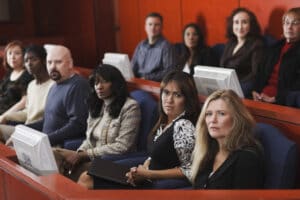A new bill may change the way that jurors can be challenged as a way of eliminating or reducing racial bias
If you are charged with a crime and choose to go to trial, you probably expect that you will face a jury of your peers — and a jury that was not picked based on race. Yet according to a new report from Berkeley Law’s Death Penalty Clinic, race is often a motivating factor in the jury selection process.
As a criminal defense attorney in San Bernardino, CA can explain, when choosing a jury, each side — the prosecution and defense — can challenge a potential juror for cause. In other words, if there is a reason why the juror should not be seated, then that juror may be excused by the court. For example, if a juror discloses that she was a victim of sexual assault in a trial where the defendant has been accused of rape, the defense lawyer may challenge her for cause. In addition to jury challenges for cause, each attorney can excuse a set number of jurors without a stated reason or the court’s approval. This is known as a peremptory challenge.
Both the California and United States Supreme Court adopted procedures to reduce the discriminatory use of peremptory challenges. Unfortunately, these procedures have not worked to actually end this practice. The study by the Death Penalty Clinic revealed that in 683 cases, prosecutors used their peremptory challenges to remove Black jurors in almost 75% of the time, Latinx jurors in 28% of the cases, and white jurors in only 3 cases (0.4%). This may be attributed to the fact that prosecutors are encouraged to use their “gut instinct” when challenging jurors — and that they are trained to have a list of race-neutral reasons to explain their strikes. The study found that prosecutors have challenged jurors for having dreadlocks, wearing large earrings or a short skirt, distrusting law enforcement, having family members who are incarcerated, and expressing a belief that the criminal justice system treats people differently based on race.
These findings are discouraging, but not necessarily surprising for anyone who has been involved in the system. However, a new law, Assembly Bill 3070, was passed by the California State Legislature in June 2020. Under AB 3070, an attorney is prohibited from using a peremptory challenge to remove a prospective juror on the basis of their race, ethnicity, gender, gender identity, sexual orientation, national origin, or religious affiliation. A party can object to the use of a peremptory challenge to raise the issue of improper bias, which then requires the party making the challenge to state the reason for it. The court will then evaluate the reasons given for the challenge and determine if bias was present.
Under this law, a peremptory challenge is presumed to be invalid if it is based on the following reasons:
- Expressing a distrust of or having a negative experience with law enforcement or the criminal legal system;
- Expressing a belief that law enforcement officers engage in racial profiling or that criminal laws have been enforced in a discriminatory manner;
- Having a close relationship with people who have been stopped, arrested, or convicted of a crime;
- A prospective juror’s neighborhood;
- Having a child outside of marriage;
- Receiving state benefits;
- Not being a native English speaker;
- The ability to speak another language;Dress, attire, or personal appearance historically associated with certain groups;
- Employment in a field that is disproportionately occupied by members of specified groups or that serves a population disproportionately comprised of members of this group or groups.
- Lack of employment or underemployment of the prospective juror or prospective juror’s family member;
- A prospective juror’s apparent friendliness with another prospective juror of a specified group;
- The prospective juror was sleeping, inattentive, or staring or failing to make eye contact, and no reasonable notice was provided to remedy the behavior;
- The prospective juror exhibited either a lack of rapport or problematic attitude, body language, or demeanor, and no reasonable notice was provided to remedy the behavior;
- The prospective juror provided unintelligent or confused answers, and no reasonable notice was provided to remedy the behavior;
- Any justification that is similarly applicable to a questioned prospective juror or jurors, who are not members of the same protected group as the challenged prospective juror, but were not the subject of a peremptory challenge by that party.
If the court finds that there was an improper basis for a peremptory challenge, it may seat the challenged juror or jurors, declare a mistrial, or provide another remedy.
The jury selection process can be complex, which is why it is important to have a skilled criminal defense attorney in San Bernardino, CA on your side. If you have been charged with a crime in California, the Chambers Law Firm will aggressively advocate for you, including challenging discriminatory juror challenges when necessary. Contact us today at 714-760-4088 or dchambers@clfca.com to schedule a free initial consultation.





